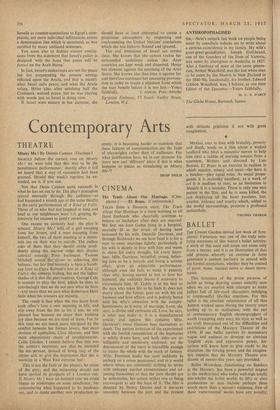CINEMA
The Truth About Our Marriage. (Cine- phone.) — El Bruto. (Continentale.) TAKEN from a Simenon story, The Truth About Our Marriage is a stern warning to all those husbands who cheerfully continue to behave as bachelors after they arc married. We first see Jean Gabin lying in a hospital, mortally ill as the result of having been poisoned by his wife, Danielle Darrieux, and through flashbacks we see how fatal it is for a man to enter marriage lightly, particularly if his wife is deeply in love with him and wants to share his every thought, his every heart- beat. Mlle. Darricux, beautiful, young, believ- ing love to be a miracle and living a serious affair, gives an admirable performance, although even she fails to make it patently clear why, having ceased at last to love her husband, she suddenly deems it necessary to exterminate him. M. Gabin is at his best as the man who takes life as he finds it, does not worry about the future, goes on with his old business and love affairs, and is politely bored with his wife's obsession with the compre- hensiveness, as it were, of marriage. Love, she says, is divine and embraces all. Love, he says, is what you make it; it is a manufactured article; and against this cynicism Mlle. Darrieux's sweet illusions beat themselves to death. The patient irritation of the experienced with the foolish romanticism of the ingenuous is subtly drawn here, and both sides are in- telligently and sensitively explored; yet the denouement of the story is incredible enough to stamp the whole with the mark of fantasy. Mlle. Darrieux looks too cool suddenly to embark on a crime passionnel, and in a world where wives are constantly coming to terms with unhappy marital circumstances and ad- ' justing themselves so that the pain should not be unbearable, her action strikes one as tieing extravagant to say the least of it. The film is directed by Henry Decoin and it see-saws smoothly between the past and the present
with delicate precision if not with great imagination.
Mexico, ever in love with brutality, poverty and death, sends us a film about a wicked landlord who hires a muscular 'moron to help him eject a rabble of starving tenants from a tenement. Written and directed by Luis Bunuel, El Bruto is an exercise in realism in which squalor, misery and meat—the hero is a butcher—play equal roles. As social propa- ganda it is probably excellent; as a work of art it is medium to rare; as an invitation to Mex,ico it is a mistake. There is only one nice person in the film, and he is soon killed, the rest displaying all the baser passions, lust, avarice, jealousy and cruelty which, added to the sordid surroundings, promote a profound melancholy.
VIRGINIA GRAHAM


































 Previous page
Previous page